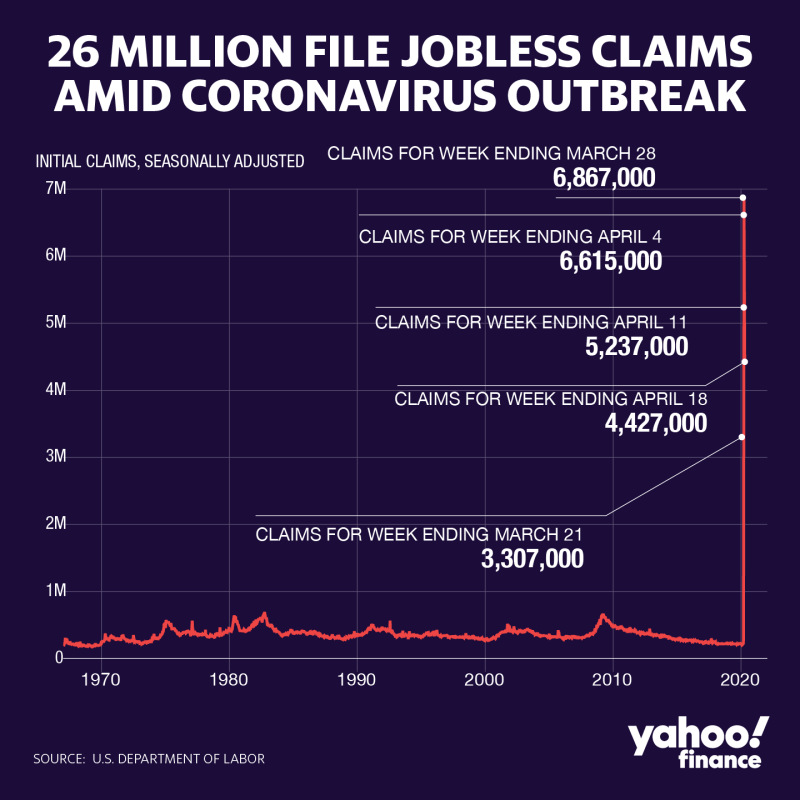Better ways to protect workers in a recession
During the last recession, from 2007 to 2009, the unemployment rate in the United States rose by 5.6 percentage points, peaking at 10%. Germany endured the same recession, but unemployment only rose by 0.7 points, to 8.3%. And Germany recovered from the recession faster.
Unemployment is spiking once again amid the coronavirus pandemic, with some economists predicting it could hit 15% or more in the United States. Congress is providing hundreds of billions of dollars to help the newly unemployed pay their bills. But some think adopting parts of the German model would keep job losses lower and make it easier for companies to ramp up production once things get back to normal.
Former Vice President Joe Biden has now proposed a form of the German model for the U.S. labor market, saying he aims to “transform unemployment insurance into employment insurance.” Germany and other European nations use a system called short-time work, or short-time compensation, that provides federal aid to companies that reduce worker hours instead of laying them off. The idea is to keep workers on the payroll and attached to a company until business conditions pick up. As demand falls, companies scale back hours but don’t lay workers off. The government makes up some of the lost pay. Employers benefit since they don’t have to bear the cost of rehiring once the recession is over.

“It's a much better system,” former Democratic presidential candidate John Delaney says on the latest episode of the Yahoo Finance Electionomics podcast. Delaney, who suspended his campaign in January, has been advising the Biden campaign on its short-time plan. “The benefit of that program is it targets industries that are most affected,” he says. “You create a system where workers get full compensation and they stay employed so they keep their benefits.”
Helping people keep their jobs
Biden, the likely Democratic presidential nominee, wants to change the focus of the U.S. system from helping people who have lost their jobs to helping people keep their jobs. About half the states have short-time programs now, but there’s no national standard or federal support. Biden wants to fund short-time compensation completely at the federal level, allowing all states to take advantage of it and raising funding levels above what’s available now. Participating companies would also get tax breaks to help offset the cost of keeping health care and other benefits for workers. Small businesses would still qualify for other forms of aid and wouldn’t have to choose one program over another.
Conservatives tend to oppose European-style worker protections, yet Congress has now passed trillions of dollars’ worth of bailouts that may exceed the generosity of many welfare-state programs. Under the recently passed stimulus plan, most Americans will get a no-strings-attached check for up to $1,200. Businesses will get more than $1 trillion in aid, with strong incentives to keep workers employed. Workers collecting unemployment insurance payments from their states will get up to $2,400 per month extra from Uncle Sam.

There’s no panacea for keeping workers employed during a recession, especially a severe one like the coronavirus pandemic is causing. Short-time work can prop up unprofitable firms that should go out of business, and a 2017 paper found it can reduce economic output because companies use labor less efficiently. The U.S. system has risks too, though, such as the possibility that some unemployed workers will hold off looking for a job because jobless benefits are relatively rich.
Biden, stuck at home like most Americans, has been struggling for attention in the presidential campaign, while President Trump generates loads of air time with near daily briefing on the coronavirus and the usual barrage of controversial tweets. “It’s hard for the vice president to cut through right now because everything’s focused on the coronavirus,” Delaney says. “What I want to see him do is start talking more about the right way to reawaken our economy after this because that’s going to be the focus as we get close to November.”
Rick Newman is the author of four books, including “Rebounders: How Winners Pivot from Setback to Success.” Follow him on Twitter: @rickjnewman. Confidential tip line: [email protected]. Encrypted communication available. Click here to get Rick’s stories by email.
Read more:
These 4 Republican states are ignoring Trump’s reopening guidelines
Get the latest financial and business news from Yahoo Finance
Follow Yahoo Finance on Twitter, Facebook, Instagram, Flipboard, SmartNews, LinkedIn, YouTube, and reddit.
